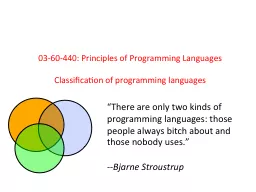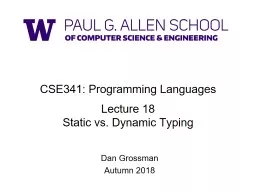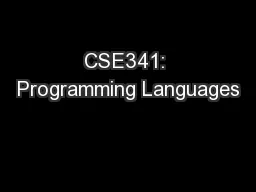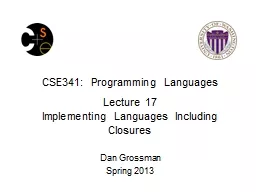PPT-Principles of Programming Languages
Author : giovanna-bartolotta | Published Date : 2016-03-13
Practice session 7 ממשק Sequence Lazy Lists נושאי התרגול The Sequence Interface רוצים לבצע פעולה כלשהי על אוסף למשל
Presentation Embed Code
Download Presentation
Download Presentation The PPT/PDF document "Principles of Programming Languages" is the property of its rightful owner. Permission is granted to download and print the materials on this website for personal, non-commercial use only, and to display it on your personal computer provided you do not modify the materials and that you retain all copyright notices contained in the materials. By downloading content from our website, you accept the terms of this agreement.
Principles of Programming Languages: Transcript
Download Rules Of Document
"Principles of Programming Languages"The content belongs to its owner. You may download and print it for personal use, without modification, and keep all copyright notices. By downloading, you agree to these terms.
Related Documents










![[eBOOK]-Programming 19:C Programming Professional Made Easy & Excel Shortcuts (Excel Programming,](https://thumbs.docslides.com/980131/ebook-programming-19-c-programming-professional-made-easy-excel-shortcuts-excel-programming-microsoft-excel-python-for-beginners-c-programming-c-programming-languages-android-c-programming.jpg)
![[BEST]-Programming 11:C Programming Success in a Day & Rails Programming Professional](https://thumbs.docslides.com/980146/best-programming-11-c-programming-success-in-a-day-rails-programming-professional-made-easy-c-programming-c-programming-c-programming-language-rails-android-programming-ruby-rails-php-css.jpg)
![[PDF]-Programming 3: Python Programming Professional Made Easy & C Programming Success](https://thumbs.docslides.com/980147/pdf-programming-3-python-programming-professional-made-easy-c-programming-success-in-a-day-c-programming-c-programming-c-programming-language-html-python-programming-python-java-php.jpg)
![[FREE]-Programming 16: Python Programming In A Day & C Programming Professional Made Easy](https://thumbs.docslides.com/980148/free-programming-16-python-programming-in-a-day-c-programming-professional-made-easy-c-programming-c-programming-c-programming-language-html-python-python-programming-coding-css-java-php.jpg)